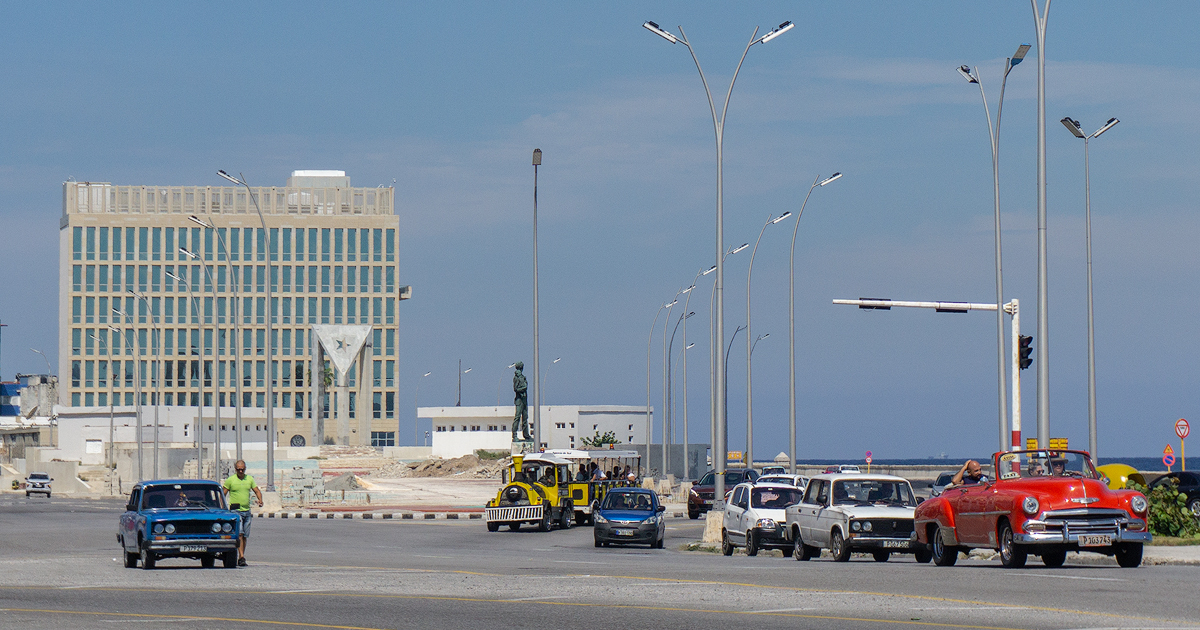
Related videos:
The U.S. Embassy in Cuba issued a protest alert on Thursday regarding the march organized by the Cuban regime in front of the diplomatic mission on December 20, and recommended that American citizens residing in or visiting the capital avoid those areas.
A day after announcing the postponement of visa application interviews scheduled for Friday, the diplomatic mission once again urged U.S. nationals to "avoid areas of protests and crowds" and to remain "vigilant in the presence of police and traffic detours."
The statement reiterated that only emergency services will be offered, as "the streets near the Malecón and the Antimperialist Tribune will be closed to traffic," which will limit access to the building.
"We remind U.S. citizens to avoid areas near protests. Even peaceful demonstrations and large gatherings have the potential to become unpredictable without warning," it warned.
The embassy announced that it will fully resume its services next Monday, December 23rd. Visa applicants affected by the cancellation of Friday's appointments will be contacted directly to reschedule.
After the leader Miguel Díaz-Canel called for a “march of the fighting people,” and on the occasion of the tenth anniversary of the thaw initiated by President Barack Obama, U.S. Assistant Secretary of State Brian Nichols made it clear to the Cuban president that the only solution for Cuba remains “democracy.”
Unaware of what the concept of democracy entails, the regime continues to enthusiastically promote the march, while many citizens question the usefulness of this mobilization when the country is facing its worst economic crisis, characterized by blackouts, shortages of food and medicine, rampant inflation, and widespread precariousness. A new year looms ahead, expected to be even harsher for the population than the one coming to an end.
In addition to the wave of criticism and public outrage over the regime's anachronistic call, Cubans have also responded with the mocking phrase "let Sandro go," referring to the opulent and self-proclaimed "young revolutionary" grandson of dictator Fidel Castro, who boasts of his privileged lifestyle.
Frequently Asked Questions about Protests and Consular Services at the U.S. Embassy in Cuba
Why did the U.S. Embassy in Cuba issue an alert for the march on December 20th?
The U.S. Embassy in Cuba issued a warning regarding a march organized by the Cuban regime in front of its headquarters in Havana on December 20. It advised U.S. citizens to avoid areas of protest, as gatherings, even peaceful ones, can become unpredictable.
What services will the U.S. Embassy in Cuba offer on December 20?
The U.S. Embassy in Cuba will only provide emergency services on December 20 due to the protest march, which will restrict access to the building. Nearby streets will be closed to traffic.
How does the march on December 20th affect visa processing at the U.S. Embassy in Cuba?
The visa application interviews scheduled for December 20 have been postponed. Affected applicants will be contacted directly to reschedule their appointments once the embassy fully resumes its services on December 23.
What is the purpose of the "March of the Fighting People" called by the Cuban regime?
The Cuban regime, led by Miguel Díaz-Canel, called for the "March of the Fighting People" to demand an end to the blockade and Cuba's removal from a list of countries allegedly sponsoring terrorism. This march is taking place amid widespread criticism and public outrage, as the country is facing a severe economic crisis.
Filed under: